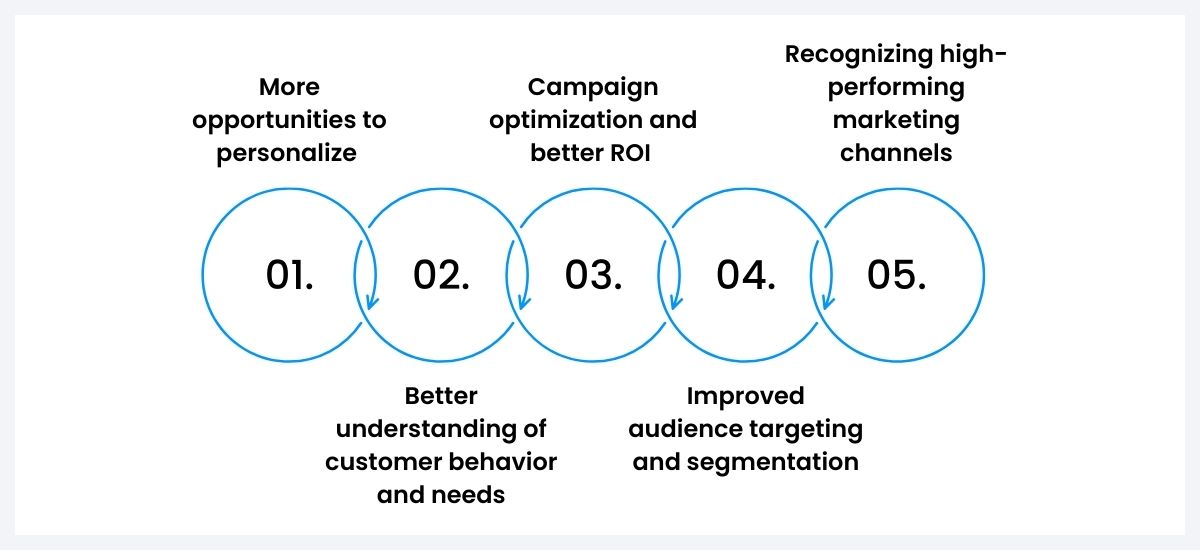The era of making marketing decisions based on gut feelings and speculations has passed. Modern businesses require a modern marketing approach. That is why today’s companies need data-driven marketing strategies to maximize reach. Such data including customer information like their preference, behavior, current trends, and more help marketers build effective marketing strategies. This ultimately brings you closer to your audiences so that you know about their requirements and can offer what they want.

However, successfully collecting and analyzing such vast data keeping privacy and security in mind can be challenging. Let us simplify the task for you through this article. Here we have discussed data-driven marketing in detail including what data-driven marketing is. how to create data-driven marketing strategies and why it is important for your business.
What is data-driven marketing?
Data-driven marketing is a process of making strategic marketing decisions on the basis of useful insights and data analysis. Instead of depending on speculations and ideas, the concept of data-driven marketing utilizes real data that offers customer details, their behavioral pattern etc.
The data can be collected in multiple ways including social media interactions, monitoring website traffic, registration, purchase history of customers and more. Detailed analysis of this data helps marketers understand current trends, audience preferences, behavioral patterns, and ultimately what works for them and what does not. Based on this analysis, they create meaningful and relevant marketing campaigns that resonate with their audiences.
Why data-driven marketing is important in 2025?
Data-driven marketing is undoubtedly more effective than traditional marketing which relies on predictions and speculations. It offers multiple benefits that make it important for all types of businesses in 2025.

With data-driven marketing practices, you get the following benefits:
1. More opportunities to personalize
Detailed analysis of customer data allows marketers to know about their preferences, behavioral patterns and more. With the help of this information, you can categorize your audiences and customize your email content to offer personalization. Research initiated by Salesforce revealed that more than 73% of customers believe that companies understand their requirements and expectations from them. To fulfill this expectation of your customers, you need to adopt data-driven marketing for your business.
Moreover, personalized marketing campaigns highly engage your customers as they can relate to it which ultimately increases conversion and client satisfaction.
2. Better understanding of customer behavior and needs
As the name suggests, data plays the lead role in data-based marketing. In simple words, in this type of marketing, the marketing strategy is built based on information generated from different sources like social media channels, websites, registrations, purchasing history, and more. Such information shows a clear picture of your customers' likes, website activities, engagement levels etc which ultimately helps marketers understand their customers and target audiences better.
3. Campaign optimization and better ROI
SEO and digital marketing have a fluctuating nature and keeping pace with the changes and new trends is crucial for every business to stay ahead of competitors. The customer data you collect from them helps you stay updated about these trends. When your marketing strategy is backed by such crucial data, your campaigns certainly become more powerful and effective than the traditional ones offering you better scope to increase your return on investment.
4. Improved audience targeting and segmentation
With customer data, it becomes easier for marketers to categorize their customers based on their age, location, professional background, purchasing nature etc. This helps you target your marketing campaigns or messages to the right audiences at the right time which leads to higher engagement and better performance.
5. Recognizing high-performing marketing channels
Marketing channels like social media, emails, search engines, etc help businesses connect with their target audiences. However, not all marketing channels perform equally for all types of business. So identifying the channels that work in favor of your company is important and that is possible only through analysing data. It helps you find out which channel is generating the most return on investment for your business.
Common data sources for marketers
Understanding which source offers you the most valuable data is the first step to create successful marketing campaigns. Here are some of the most common data sources for marketers:
1. Website analytic tools
Website analytical tools help you understand the way your visitors interact with your website. They offer useful insights on session duration, page views, conversion, bounce rate and more. By tracking this data companies can optimize their website structure, content and more to make them more engaging for viewers.
2. CRM systems
CRM systems save your customer data including their details, purchasing history, service interactions and other records of communications. Marketers usually utilize this data to personalize their email marketing campaigns to boost engagement, customer loyalty and retention.
If you run a WordPress events website, WP Event Manager offers several CRM intigrated plugins that you can utilize for building data driven marketing strategies. These plugins include Hubspot CRM, Sendinblue, Mailchimp, Salesforce CRM and more.
3. Plugins
Plugins also offer useful insights and data for your business which are helpful in empowering your marketing strategies. For example, the Sell Titckets and Registration addon of WP Event Manager provide users with the total number of registrations, ticket sales, and more such details that help you measure the performance of an event.
4.Customer feedback
When it comes to qualitative data, nothing can beat the importance of customer feedback. The other data sources mentioned here mostly offer quantitative metrics whereas this one enlightens marketers with customer experience, opinions, preferences, and satisfaction level. Based on their feedback businesses can improve their products, service,s and user experience.
4. Social media metrics
Social media metrics generally revolve around the number of followers, views. likes, shares, and comments. They clearly show the fruitfulness of a social media post or campaign and the kind of content that their audiences prefer. They are important to drive audience engagement and participation.
Wrapping up
Data driven marketing has an endless number of benefits that marketers can not ignore. It efficiently strengthens your marketing strategies, helps you enhance your audience reach, boost customer engagement, bridge the gap between you and your customers.


 Use coupon code:
Use coupon code:  Something exciting is coming soon – stay tuned to find out! 🚀✨
Something exciting is coming soon – stay tuned to find out! 🚀✨
